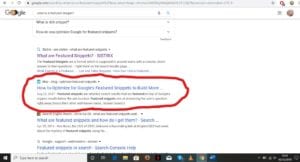When it comes to content for your company’s website, more is always better, provided, of course, that it’s high-quality content.
Content, as we have discussed before, includes blog posts, social media posts, general descriptive information about your organization’s vision, mission, staff, location, products, services, and so on.
If you run a business, then above all else, your content should engage people. Your content should drive traffic to your website. And once a searcher is on your website, that content should be compelling enough to hold the attention of that user long enough for that person to become a customer.
How can you accomplish this? By creating content that is engaging, informative, and soothes the “pain” that the searcher is feeling. The pain is what caused that person to want to conduct a search in the first place.
This pain can take many forms. Your potential customer is increasingly likely to express pain in the form of a full-fledged question, especially as voice searches become more prevalent.
Such pain-related questions may include:
“How can I drive more traffic to my website?”
“How many presidents have been impeached?”
“Where can I get some poutine near me?”
As you can see, there’s a broad range of questions that people might ask hoping to satiate their hunger for information and other things.
If you run a business, the key is for you to be found (preferably first) as the answer to one of these questions.
Content does that for you!
So, back to our original question: What sort of content should you create in order to get readers’ attention (and keep it)? Read on!
Strive to be a Featured Snippet
An overwhelming majority of all search engine traffic goes through Google.
You probably use Google. If so, you have likely seen a featured snippet at some point when you have asked that search engine a question.
To see what a featured snippet is, if you don’t know, check out the screenshot below:
In this example, the featured snippet features a snippet that defines what a featured snippet is. (Got it?)
The SEO gurus at Moz have done an admirable job of explaining what a featured snippet is. And Google has rewarded them with the coveted featured snippet spot as a result.
In case you can’t quite make out the definition in the screenshot above, know that a featured snippet is a portion of content which Google places in a box above the rest of the organic results on a search engine results page in response to a query. Yes, above the number 1 result!
Google does this, presumably, because its algorithm deems the result in the featured snippet to be the best answer to a searcher’s question and then places it there.
Now, if you’re developing content for your site, here’s some great news: The featured snippet doesn’t always come from the page that ranks first in the organic search results.
In other words, if you write content so helpful that Google’s algorithm deems it to be the best answer to a frequently asked question, then you can actually leapfrog over results that appear above you and get displayed in the featured snippet box!
You can see this in action in the screenshot below. The featured snippet came from the Moz site, but Moz is actually second, not first, in the list of organic results Google provides as an answer to the question:
Speaking of Frequently Asked Questions…
You always want to be of use to any searcher, and you always want Google to recognize that.
The best way to be helpful to anyone using a search engine is to answer questions. And the most efficient method for accomplishing this, of course, is to anticipate people’s questions before they’re asked. That’s where your site’s FAQ page can come in.
Composing a page with frequently asked questions is one of the most effective steps you can take to raise the profile of your company’s website.
Creating an FAQ page for your website allows you to place an abundance of relevant keywords related to your business and industry all in one place.
Remember that the use of voice search is on the rise. This is a trend that is projected to continue as people become ever more comfortable consulting virtual assistants to satisfy their information needs. When you compose your FAQ page, structure the questions just as you would expect a potential customer to ask them. Use the same language a layperson might use and you may match up exactly with a user’s query.
If your FAQ page is thorough enough or helpful enough, this could be your company’s ticket to the featured snippet box.
Show Us Your Infographics!
Infographics are valuable pieces of content. They may serve as possible gateways to a whole new potential customer base.
Why? Because, let’s face it, many people simply aren’t going to read through pages (or even a single page) of just text. Infographics are more eye-catching and much easier for busy searchers to engage with. As a result, your potential clients are more likely to read an infographic all the way through. The longer their eyes stay on your website, the better it is for your SEO.
Plus, infographics are an excellent way to repurpose content that you have previously created. Have you composed a blog post that tackled an aspect of your industry particularly well? Turn it into an infographic and release it into the world again! The time you’ll spend on the graphical layout is more than offset by what you save on not developing an entirely new set of ideas.
Video Saved the SEO Star
When you’re tired of text, and even an infographic isn’t lively enough for you, try some video content!
Video content gives you the chance to liven up your website and your social media feeds. It can add some personality to your business, which may help to forge a connection with your audience of potential customers. Plus, it gives you a chance to be creative in a different way. And although text interviews can be interesting, video interviews are even more riveting, especially interviews with influencers!
Perhaps more important than that are these stats about video content and social media engagement. In short, social media content consisting of videos receives more engagement and produces more fruitful returns. Even if you’re camera-shy, it’s worth it.
In Conclusion
As always, more content is better. Higher quality content is better. A greater variety of content is better.
Compose those FAQ lists and strive to be a featured snippet. Repurpose your blog post text as a helpful infographic. And increase your company’s engagement with your audience by posting videos on Facebook, Twitter, LinkedIn, and Pinterest.
Still stuck? Reach out to Triple Canopy Media! We can help you to develop the content that will elevate your business to the next level.





